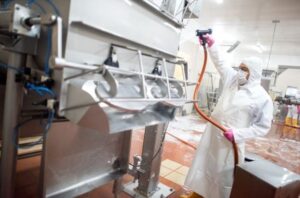Why Is Food Safety and Sanitation Essential for SQF Audits?

How prepared is your facility for its next SQF audit?
The role of food safety and sanitation cannot be overstated when it comes to ensuring your food processing plant meets the strict requirements of an SQF audit. Cleanliness and hygiene are critical to achieving certification and maintaining customer trust.
An SQF (Safe Quality Food) audit requires food facilities to adhere to high hygiene and safety standards, ensuring that products are safe for consumption.
With foodborne illnesses rising, stringent regulations are enforced to protect consumers and ensure food production facilities maintain a pristine environment. Explore why food safety and sanitation are key to passing these audits and how your facility can prepare effectively.
1. SQF Audits and Their Role in Food Safety
SQF audits assess a facility’s compliance with food safety regulations. These audits are part of a broader certification process recognized worldwide.
They focus on various aspects of food production, including sanitation practices, employee hygiene, and contamination prevention. Simply put, with proper food safety and sanitation protocols, passing an SQF audit becomes possible.
Maintaining thorough documentation, following a well-structured sanitation program, and implementing regular staff training can significantly contribute to the success of your audit.
A facility that prioritizes these measures will be better equipped to meet the expectations set by the SQF certification process.
2. Why Sanitation Is Key for Audit Success
Food safety and sanitation play a vital role in preventing contamination at every stage of the food production process.
Sanitation affects the entire operation, whether by keeping work surfaces clean, ensuring equipment is sanitized, or implementing personal hygiene standards. Auditors pay close attention to these practices because they are directly linked to the safety of the final product.
Sanitation measures ensure that harmful bacteria, viruses, and other contaminants do not compromise food quality.
A well-documented cleaning schedule and staff trained in sanitation protocols demonstrate a commitment to food safety, which auditors look for when evaluating your facility. Consistently meeting these standards will help you maintain compliance and safeguard your business from the risk of contamination-related issues.
3. Best Practices for Sanitation During SQF Audits
What are some of the best practices for ensuring your facility is audit-ready? Here are a few critical steps to consider:
A. Comprehensive Cleaning Protocols
A key part of passing an SQF audit is having a detailed cleaning protocol that covers every area of your facility. Regular cleaning schedules should be documented and adhered to rigorously.
Ensure that all areas, from production lines to storage spaces, are regularly sanitized. High-touch surfaces should receive extra attention to prevent cross-contamination.
B. Proper Employee Training
Staff training is another essential aspect of food safety and sanitation. Employees should be thoroughly trained in hygiene practices, including correctly using sanitizing agents, proper handwashing techniques, and wearing appropriate protective gear.
Training should be ongoing, with refreshers provided regularly to keep everyone updated on best practices.
C. Monitoring and Documentation
Accurate documentation is critical for ensuring compliance with sanitation standards. During an SQF audit, the auditor will review records to verify that your facility follows its sanitation procedures.
Detailed logs of cleaning activities, equipment maintenance, and staff training will help you pass the audit.
D. Pre-Audit Inspections
Conducting internal inspections before an official SQF audit can help identify areas for improvement.
Pre-audit checks can pinpoint issues in sanitation protocols or equipment cleanliness, allowing time for corrective action before the formal audit takes place. This proactive approach ensures your facility is always audit-ready.
4. Common Sanitation Challenges and How to Overcome Them
Despite best efforts, some facilities need help with common food safety and sanitation challenges.
For instance, staff turnover can make it difficult to maintain consistent training, and equipment failures can lead to delays in sanitation schedules. However, these challenges can be overcome with a strategic plan.
Using automated systems to track cleaning activities and maintaining a backup staff for critical sanitation roles can help ensure consistency. Additionally, investing in reliable equipment that minimizes breakdowns can prevent sanitation-related delays.
5. The Role of Food Safety in Protecting Public Health
At the heart of food safety and sanitation is the responsibility to protect public health. Contaminated food can lead to outbreaks of foodborne illnesses, which can cause serious health risks and damage a company’s reputation.
SQF audits ensure that facilities uphold the highest safety standards in food production. Meeting these standards is not only crucial for audit success but also for the well-being of consumers.
Conclusion
Ensuring robust food safety and sanitation practices are in place is essential for the success of any SQF audit. By prioritizing these efforts, your facility will be better prepared to meet audit requirements and maintain the trust of your customers.
For expert guidance in managing these sanitation challenges, Sanitation Specialists can provide the support you need to excel in your next audit.

